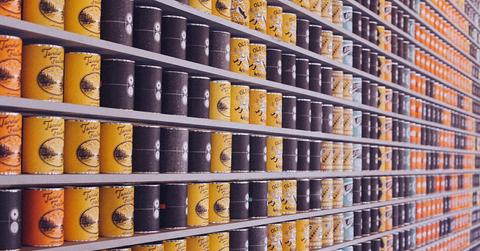Why "BPA-Free" Alternatives Can Still Be Toxic
Phasing out BPA seems like a great idea, until you discover that new studies reveal that BPA-free doesn’t always mean transparency around what’s being used instead. Here's what you need to know about all of those "BPA-free" labels.
Updated May 24 2019, 3:45 a.m. ET
You can’t turn around without hearing news that something in the food you eat every day is toxic for you. Fat. Sugar. Coffee. Wine. Chocolate. Tofu. The linings of cans holding our soups, tomato sauces, and canned vegetables.
And as often as we hear things are bad, the same food turns out to have beneficial qualities. First there was too much fat. Then low-fat food had too much sugar. Avocados aren’t good for you. Avocados are superfoods. Soy is bad. Soy is good.
If you want to cut through all the confusion, suffice to say you’re best off steering clear of processed foods altogether. When in doubt, choose whole grains and local produce. Buy ingredients, not packaged products. Do that and you don’t have to worry so much about fats, sugars or calories as long as you’re eating “clean.”
But when it comes to canned foods, it’s harder and harder to win. In case you needed another reason to give up processed and cans soups, fish, sauce and produce, it turns out the BPA-free cans lining your supermarket shelves aren’t necessarily any less toxic for you than the BPA-riddled cans we were all so afraid of a few years ago.
Here’s what’s going on.
What is BPA?
Bisphenol A (BPA) is a compound often used in the manufacturing of plastics and the lining of many canned foods and drinks. The problem? BPA has been classified in large quantities as an endocrine-disruptor linked to higher levels of ADHD, asthma, cancer, type 2 diabetes, and obesity.
While conflicting studies suggested the levels of BPA in can linings is nowhere near high enough to harm human beings, companies were quick to make the switch to cans marked BPA-free. California added BPA to the state’s Prop. 65 list, a compilation of chemicals known to add reproductive harm, including birth defects. Companies like Campbell's, which ranked worst with 100 percent of its can linings riddled with BPA, promised to phase BPA out of their canned goods.
‘Different’ isn’t always better.
Phasing out BPA seems like a great idea, until you discover that new studies reveal that BPA-free doesn’t always mean transparency around what’s being used instead. Some companies are using plastics like PVC copolymer, vinyl and polyester—not reassuring when you realize vinyl may have phthalates that are as bad for you as the BPA you’re trying to avoid.
A 2016 collaborative study by five non-profits warns about BPA as well as its replacements. Using 200 cans of food from popular brands including health food companies Annie’s Homegrown and Eden Foods, the research turned up BPA, acrylic resins, oleoresin, polyester resins, and polyvinyl chloride (PVC) copolymers.
BPA-free cans were often lined with PVC-based copolymers that are made with vinyl chloride, which the National Cancer Association says is linked to increased risk of liver, brain and lung cancers, lymphoma and leukemia. It just doesn't seem right that we wind up poisoning ourselves in our attempts to eat healthy.
Keeping these toxins out of your body is easy.
If you can’t help occasionally buying something canned, make sure what you do buy contains low-acidity foods. Acid leeches the toxins from the can directly into the food, with canned tomatoes being the worst offenders.
That said, your surest way of keeping BPA, PVCs, resins and other plastics and toxins out of your body is to stop buying food in metal cans altogether. There are plenty of other options that are fresh, frozen, home-canned, or canned in glass instead of metal. This removes the guesswork, promising you healthier alternatives without the headache.
